外研版高中英语必修一高一英语期中考试题
- 格式:docx
- 大小:57.00 KB
- 文档页数:11
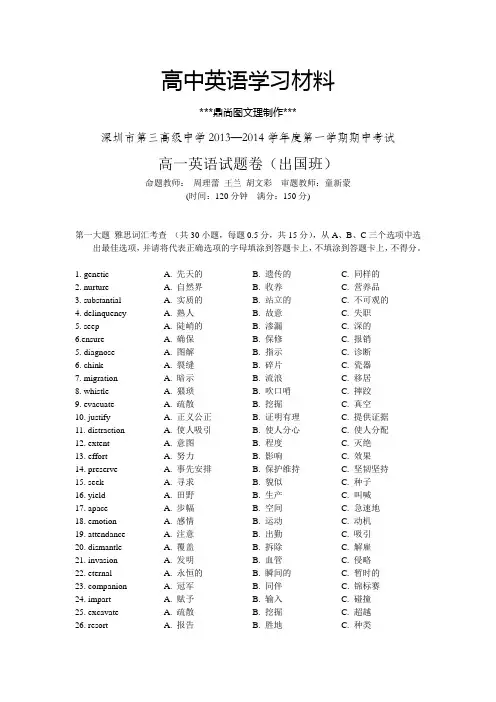
高中英语学习材料***鼎尚图文理制作***深圳市第三高级中学2013—2014学年度第一学期期中考试高一英语试题卷(出国班)命题教师:周理蕾王兰胡文彩审题教师:童新蒙(时间:120分钟满分:150分)第一大题雅思词汇考查(共30小题,每题0.5分,共15分),从A、B、C三个选项中选出最佳选项,并请将代表正确选项的字母填涂到答题卡上,不填涂到答题卡上,不得分。
1. genetic A. 先天的 B. 遗传的 C. 同样的2. nurture A. 自然界 B. 收养 C. 营养品3. substantial A. 实质的 B. 站立的 C. 不可观的4. delinquency A. 熟人 B. 故意 C. 失职5. seep A. 陡峭的 B. 渗漏 C. 深的6.ensure A. 确保 B. 保修 C. 报销5. diagnose A. 图解 B. 指示 C. 诊断6. chink A. 裂缝 B. 碎片 C. 瓷器7. migration A. 暗示 B. 流浪 C. 移居8. whistle A. 猥琐 B. 吹口哨 C. 摔跤9. evacuate A. 疏散 B. 挖掘 C. 真空10. justify A. 正义公正 B. 证明有理 C. 提供证据11. distraction A. 使人吸引 B. 使人分心 C. 使人分配12. extent A. 意图 B. 程度 C. 灭绝13. effort A. 努力 B. 影响 C. 效果14. preserve A. 事先安排 B. 保护维持 C. 坚韧坚持15. seek A. 寻求 B. 貌似 C. 种子16. yield A. 田野 B. 生产 C. 叫喊17. apace A. 步幅 B. 空间 C. 急速地18. emotion A. 感情 B. 运动 C. 动机19. attendance A. 注意 B. 出勤 C. 吸引20. dismantle A. 覆盖 B. 拆除 C. 解雇21. invasion A. 发明 B. 血管 C. 侵略22. eternal A. 永恒的 B. 瞬间的 C. 暂时的23. companion A. 冠军 B. 同伴 C. 锦标赛24. impart A. 赋予 B. 输入 C. 碰撞25. excavate A. 疏散 B. 挖掘 C. 超越26. resort A. 报告 B. 胜地 C. 种类27. regent A. 近来 B. 摄政者 C. 代理人28. subliminal A. 下意识的 B. 潜艇 C. 附属的29.burgeon A. 外科医生 B. 迅速成长 C. 蜂拥而出30. chronic A. 挖苦的 B. 挑选的 C. 慢性的第二大题语法题从A、B、C、D四个选项中选出最佳选项,并请将代表正确选项的字母填涂到答题卡上,不填涂到答题卡上,不得分。
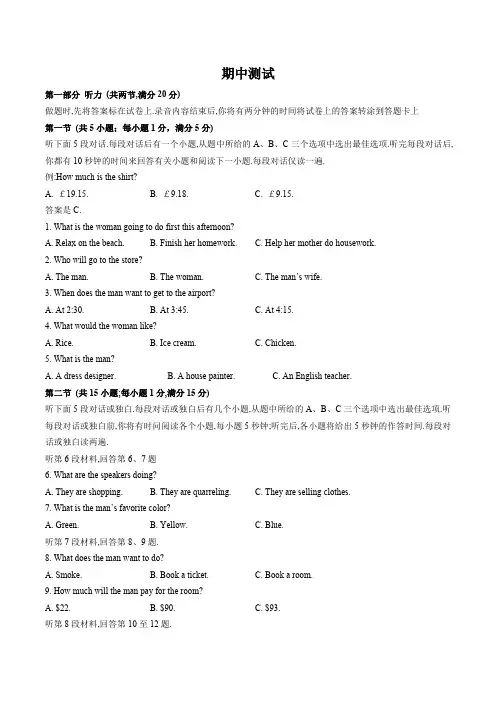
期中测试第一部分听力(共两节,满分20分)做题时,先将答案标在试卷上.录音内容结束后,你将有两分钟的时间将试卷上的答案转涂到答题卡上第一节(共5小题;每小题1分,满分5分)听下面5段对话.每段对话后有一个小题,从题中所给的A、B、C三个选项中选出最佳选项.听完每段对话后,你都有10秒钟的时间来回答有关小题和阅读下一小题.每段对话仅读一遍.例:How much is the shirt?A. £19.15.B. £9.18.C. £9.15.答案是C.1. What is the woman going to do first this afternoon?A. Relax on the beach.B. Finish her homework.C. Help her mother do housework.2. Who will go to the store?A. The man.B. The woman.C. The man’s wife.3. When does the man want to get to the airport?A. At 2:30.B. At 3:45.C. At 4:15.4. What would the woman like?A. Rice.B. Ice cream.C. Chicken.5. What is the man?A. A dress designer.B. A house painter.C. An English teacher.第二节(共15小题;每小题1分,满分15分)听下面5段对话或独白.每段对话或独白后有几个小题,从题中所给的A、B、C三个选项中选出最佳选项.听每段对话或独白前,你将有时问阅读各个小题,每小题5秒钟;听完后,各小题将给出5秒钟的作答时间.每段对话或独白读两遍.听第6段材料,回答第6、7题6. What are the speakers doing?A. They are shopping.B. They are quarreling.C. They are selling clothes.7. What is the man’s favorite color?A. Green.B. Yellow.C. Blue.听第7段材料,回答第8、9题.8. What does the man want to do?A. Smoke.B. Book a ticket.C. Book a room.9. How much will the man pay for the room?A. $22.B. $90.C. $93.听第8段材料,回答第10至12题.10. What do we know about the woman?A. She has got the flu.B. She was hurt by a rose.C. She has had a cough for days.11. What does the man tell the woman to do?A. Go around from time to time.B. Stay in bed and take some medicine.C. Go to see him tomorrow morning.12. Where does this conversation take place?A. In a garden.B. In the hospital.C. In the woman’s house.听第9段材料,回答第13至16题.13. What does the woman want to do?A. Go to school.B. Go to a Chinese theater.C. Invite the man to have dinner.14. When will the speakers meet?A. This Sunday.B. Next Sunday.C. Next Saturday.15. Where will the speakers meet?A. At the man’s home.B. In the restaurant.C. At the school gate.16. Which of the following does the man decide to bring?A. A new dish.B. Some fruit.C. A new book.听第10段材料,回答第17至20题.17. How old was Mary when her family moved to a new city?A. six years old.B. Seven years old.C. Eight years old.18. How did Mary usually go to school?A. By school bus.B. By car.C. On foot.19. Why did Mary get up late that morning?A. She was sick.B. She stayed up late the day before.C. There was something wrong with her clock.20. What can we learn from the speech?A. Mary’s house was near her school.B. Mary’s mother was familiar with the way to school.C. The driver always took the shortest way to school.第二部分阅读理解(共15小题;每小题3分,满分45分)阅读下列短文,从每题所给的A、B、C和D四个选项中,选出最佳选项AOxford and Cambridge TourWhat includedWalking tour of Oxford and Cambridgea visit to Christ Church CollegeFree lunch packAir-conditioned busesWalking tour of OxfordFollow the footsteps of Oxford’s famous students, from C.S. Lewis to Bill Clinton, as you walk the beautiful college courtyards of this historic university town. See the Bodleian Library, which is one of the oldest libraries in Europe on your visit. You’ll be attracted by the squares of this naturally beautiful town.Christ ChurchChrist Church is known as one of the major places for the harry Potter films! You will be surprised at the magical grandeur (壮丽)of the Great Hall, used as the setting for Hogwarts.Senate HouseOnce you’ve left Oxford, you’ll make your way to the beautiful city of Cambridge. It’s here that you will visit Senate House at the world-famous University of Cambridge. It used to be the Council of the senate for important meetings, but it is now the chosen place for students’ degree celebration. You’ll get to travel this special place and discover its important history.Please Note:You must bring the e-ticket to enter this tour.Bookings which are made after midnight for the same day will not include a free lunch pack.During busy periods, buses without Wi-Fi may be used.TimeApril 1 to October 31Days of departure Tuesday, Thursday and SaturdayCheck-in: 8:00 amDeparture: 8:30 amReturn: 7:00 pm1. Which of the following is included in the tour?A. Free breakfast pack.B. Free buses travelling in Oxford.C. Professors introduction.D. Air-conditioned buses.2. What is Christ Church famous for?A. The place that Bill Clinton once visited.B. Footsteps of Oxford’s famous students.C. A major place for the harry potter films.D. Many beautiful squares.3. What will happen if you book the trip after midnight for the same day?A. You won’t get free lunch.B. You’ll pay more for the trip.C. You don’t need to bring the e-ticket.D. You’ll take buses without Wi-Fi.BI still remember a lovely girl, though I don’t know her name.We met in the Children’s Hospital. I was 11. I was born with a hole in my heart. So was the five-year-old girl in the bed beside me. We were both recovering from the same operation. Because I was older and wiser, I thought it was my job to look after her. “Do you want to hear a story?” I asked her one afternoon. “Great!” she said.It was so easy to make her happy. She seemed always to be smiling or singing songs.Life wasn’t fair. She passed away. My recovery went well. “You’re really lucky”, a nurse told me. “But how come my operation was so easy and hers wasn’t?” I asked. “Easy?” my dad said. “David, your operation wasn’t easy at all. We thought we were going to lose you. For two weeks after your operation many things could go wrong. You’re really lucky. When you were in the coma (昏迷), she used to come over to your bed and sing to you. She was watching over you.” my dad said.My surgery scars (手术疤痕) are hidden under my shirt along with the memory of that kind little girl. She will be at my side like a small angel (hi). I am old and wise enough now to know that I have an angel watching over me whenever life is fair or unfair.4. Why did the writer look after the little girl?A. He thought it was his duty.B. Her parents were busy.C. She wanted to hear stories.D. She was his best friend.5. What was the girl’s character like?A. Shy.B. Positive.C. Careless.D. Humorous.6. What can we learn about the writer?A. He stayed in hospital for a short time.B. It was easy for him to recover from illness.C. A nurse in the hospital said he was unlucky.D. He treasures the memory of that little girl.7. What makes the writer still remember the girl?A. Her death.B. her dancing.C. Her kindness.D. Her growth.CIt’s reported that scientists in London have found the best diet for both humans and the planet.If the world followed the so-called “planetary health” diet, each year more than 11 million early deaths could be avoided according to the scientists. For the health of the planet, they say the same diet will reduce (减少)greenhouse gases and save more land, water and animals. This new food plan is the result of a three-year project organized by The Lancet health journal.Tim Lang, a professor at Britain’s University of London. He said, “The food we eat and how we produce it decide the health of people and the planet.” Lang added, the world’s population is expected to grow to 10 billion people by 2050. If we want to feed everyone, we all need to change what we eat and the way we eat by improving food production and reducing food waste”. So, what do you eat on the “planetary health” diet?The scientists who created the “planetary health” diet say it is largely plant-based but still has a little milk, fishand meat. The diet calls for cutting down red meat and sugar by 50 percent and increasing nuts, fruits, and vegetable.Walter Willet of Harvard University in the United States also talked about the “planetary health” diet. He said, “More than 800 million people around the world do not get enough food while many more people have very unhealthy diets.”The scientists think it difficult to reach their aim. But for them, doing nothing is also not a choice Willet said, “If we can’t make the best diet, it’s better to try and get as close as we can.”8. What decides the health of people and the planet according to Tim Lang?A. The taste of the food.B. The number of population.C. The climate and our living conditions.D. The food we eat and the way we produce it.9. What does the “planetary health” diet mainly contain?A. Milk.B. Meat.C. Sugar.D. Plants.10. What do scientists say about the “planetary health” diet?A. It is very easy to produce it.B. It is better to try their best to make it.C. It is better to do nothing than fail.D. It is impossible to make it.11. What is the best title for the text?A. Humans Health Is Very Important.B. Many People don’t Get Enough Food.C. A New Kind of diet may Save the Plane.D. Different People have Different Eating Habits.DAbout 10 percent of public school students in the United States learn English as a second language. In some states, that number is much higher. About five million students in the country are considered English language learners, or ELLs. Such students are the fast-growing group in the US public schools.The most commonly first spoken languages among ELLs in America are Spanish, Arabic, Chinese, Haitian Creole and Vietnamese. Speakers of those five languages make up 92 percent of all ELLs included in the report.English language learners can choose one of several kinds o1 program. There are some programs, in which students are mostly taught in their native language. And there are other programs, which offer students almost all classroom teaching in English. However, these kinds of programs do not always allow students to write and read in their native language.There are also so-called bilingual programs. These programs offer teaching in two languages-English and another language. Research has shown that English language learners do best in bilingual programs, especially if the second language is their native language.The lack of high-quality bilingual programs is clear. Nationally, about 83 percent of students complete their high school education. But the graduation rate (比率) among English language learners is far lower 65 percent.School systems across the country sometimes look for bilingual educators internationally. But education experts say there are ways for states to find and train new teachers in their own areas. This spring, America came up with a list of “grow your own” rules for schools and states to follow. It advised states to offer a series of ways for bilingualteachers. It also suggested training bilingual teachers in their own areas even if they do not have a college degree.12. What can we learn about English from paragraph 1?A. It is difficult for most students.B. It is popular as a second language in American public schools.C. It is easy for foreign students.D. It is not welcome by public school students.13. How many types of programs for English language learners are mentioned in the text?A. One.B. Two.C. Three.D. Four.14. What does the underlined word “bilingual” in paragraph 4 mean?A. Learning one language.B. Using two languages.C. National.D. International.15. Where is the text probably from?A. An educational magazine.B. A maths paper.C. A diary.D. A storybook.第三部分语言知识运用(满分65分)第一节(共20小题;每小题2分,满分40分)阅读下面短文,从短文后各题所给的A、B、C和D四个选项中,选出可以填入空白处的最佳选项.Our family enjoyed a beautiful house plant for over thirty years. It had stayed with us through 16 years and good times, pain and joy. I had never thought of 17 it.However, two weeks ago, we 18 some changes of its leaves, which began to lose its color. We watered and looked after it even to the point of 19 it, like a child. But it just showed no sign of 20 . We finally picked a few almost dead leaves and 21 replanting them in another small pot.What 22 us was that these leaves which had been planted in the new pot grew strong. In order to know the reason 23 the house plant died, we dug the dead plant out of the pot Then, it became 24 to us—its roots (树根) were in disorder, completely tangling up (绞在一起). They had grown so massive (大量的) that they 25 the sides of the pot. Our once-beautiful plant 26 because it grew out of its environment—it became root-bound (根满盆的).People can become root-bound, too. Those who 27 personal growth or development often want to make 28 that can lead to greater achievements (成就) or much more happiness. However, they more often 29 they outgrow their environment and want to 30 . Their views become larger and they need 31 environment to live in. They need people who will make 32 for their growth. If they cannot be 33 , some problems are sure to appear.So if your new-found growth 34 you to push against the old ways, you may need to 35 you are bigger now.16. A. peaceful B. hard C. pleasant D. busy17. A. controlling B. buying C. losing D. sell18. A. made B. recorded C. collected D. discovered19. A. admitting B. loving C. sending D. punishing20. A. strength B. trouble C. growth D. recovery21. A. avoided B. practiced C. tried D. enjoyed22. A. amazed B. disappointed C. embarrassed D. bored23. A. why B. where C. when D. how24. A. happy B. useful C. energetic D. clear25. A. ate B. managed C. stopped D. burst26. A. grew B. survived C. died D. arrived27. A. depend on B. look for C. wait for D. turn down28. A. suggestion B. studies C. explanations D. changes29. A. ask B. think C. find D. remember30. A. take off B. fall down C. calm down D. set off31. A. larger B. warmer C. safer D. taller32. A. chances B. promises C. time D. room33. A. satisfied B. accepted C. mentioned D. protected34. A. organizes B. causes C. permits D. teaches35. A. refuse B. order C. realize D. prove第二节(共10小题;每小题1.5分,满分15分)阅读下面短文,在空白处填入1个适当的单词或括号内单词的正确形式.I gave one of my favorite sun hats recently to a friend Jack who had been looking for one like mine for several36 (week). I found it online and had it sent to him for his birthday.Later, I 37 (lose)my own and I was upset! That hat had traveled everywhere with me. But then a 38 (difference) friend came back from his trip to the Philippines. 39 did he give me as a gift? A sun hat!I want to host my friends and cook a dinner for the large group this week. 40 (fortunate), I have the chance to cook for a large group of people in my life. I enjoy 41 (learn)a few new recipes (食谱)on my own, shopping for the food, and cooking for them. Just today, I hiked with Jack and when we said goodbye, he took a box of food out and he wanted me 42 (have)them. There were all kinds of potatoes, onions, pears, apples and peaches. Those foods can be ready for the large group of my friends. Jack didn’t attend my party nor did he know about 43 dinner this week, and he didn’t do it 44 purpose. What an unexpected thing! Since then, Jack and I have been 45 (close)than ever.第三节:单词填空(共5小题;每小题1分,满分5分)根据首字母或汉语提示,填入适当的单词形式46. You don’t sound very ________ (热情的)about the idea.47. I believed that the world was not ________ (创造)by God.48. The school has decided to take a different a________ to discipline.49. The dish washing machine is a useful piece of e________ for the kitchen.50. My ________ (助理)is clever and today he’ll show the machine in action.第四节:短语填空(共5小题;每小题1分,满分5分)根据汉语提示完成句子,填入适当的短语形式,每空一词.51. The cake was ________ ________ (被分成……)two pieces.52. We are willing to ________ ________ (交流思想)and learn from others.53. In the past few years, they have ________ ________ (修建)many buildings.54. The organization generally ________ ________ (由……组成)ten members.55. You have every reason to ________ ________ ________ (为……感到骄傲)your country and nation.第四部分书面表达(满分20分)56.假定你是李华,请给你的英国朋友Peter写封信,谈谈你在高中的学习情况,内容包括:1.一件在高中学习中令你印象深刻的事情;2.个人对高中学习的感想和展望.注意:1.词数100左右:2. 可以适当增加细节,以使行文连贯.Dear Peter,________________________________________________________________________________________ ____________________________________________________________________________________________ ____________________________________________________________________________________________ ____________________________________________________________________________________________ ____________________________________________________________________________________________ ____________________________________________________________________________________________Yours,Li Hua期中测试答案解析第一部分第一节【答案】略第二节第二部分【答案】略A 【文章大意】这是一篇应用文.文章介绍了英国牛津和剑桥一日游项目,介绍了它包含的内容、牛津徒步游、圣基督教会学院等具体的参观项目.1.【答案】D【解析】细节理解题.本题问是牛津和剑桥一日游包含哪个内容,由文章第一个黑色小标题下的内容可知,牛津和剑桥一日游包含:牛津徒步游、参观圣基督教会学院、免费的午餐和空调大巴.故选D .2.【答案】C【解析】细节理解题.由问题中的“Christ Church ”可将本题答案定位在文章第三个黑色小标题下.由其中的“Christ Church is known as one of the major places for the harry Potter films!(圣基督教会学院以其作为哈利波特电影的主要拍摄地之一而闻名.)”可知,圣基督教会学院出名的原因是它是哈利波特电影的主要拍摄地之一.故选C .3.【答案】A【解析】细节理解题.由文章中的“Bookings which are made after midnight for the same day will not include a free lunch pack.(晚上十二点之后订的当天的票不包含免费的午餐)”可知,晚上十二点之后订的票不包含免费的午餐.故选A .B 【文章大意】这是一篇记叙文.文章讲述了作者小时候在医院手术时遇到一个小女孩故事,小女孩很善良,虽然小女孩没有康复,但是她的善良永远留在了作者心中.4.【答案】A【解析】细节理解题.由文中的“Because I was older and wiser, I thought it was my job to look after her.(因为我比她大,比她聪明,所以我认为照顾她是我的职责.)”可知,作者之所以照顾小女孩是因为他觉得这是他的职责.故选A .5.【答案】B【解析】推理判断题.由文章第三段“It was so easy to make her happy. She seemed always to be smiling or singing songs.(让她高兴是件很容易的事情.她好像一直都微笑,或者在唱歌.)”可推断,这个小女孩性格很开朗,有积极向上的生活态度.A. Shy 害羞的; B. Positive 乐观的;C. Careless 不仔细的;D. Humorous 幽默的.故选B .6.【答案】D【解析】推理判断题.由文章最后一段中的“My surgery scars (手术疤痕)are hidden under my shirt along with the memory of that kind little girl.(我的手术伤痕和我对那个善良的女孩的记忆都藏在衬衫内.)”可知,作的的者很珍惜与小女孩相处的那段时光.故选D.7.【答案】C【解析】推理判断题.由最后一段中的“My surgery scars(手术疤痕)are hidden under my shirt along with the memory of that kind little girl.(我的手术伤痕和我对那个善良的女孩的记忆都藏在衬衫内.)”以及最后一段中作者把小女孩比喻成为天使,可推知,小女孩的善良让作者记忆深刻.A. Her death.她的死亡;B. Her dancing.她的舞蹈;C. Her kindness.她的善良;D. Her growth.她的成长.故选C.C【文章大意】这是一篇新闻报道.文章介绍了伦敦几位科学家最近发现的所谓的“地球健康”饮食方式.介绍了这种饮食方式对地球的好处、可以通过改变人们的饮食方式进而保护地球的潜力、这种饮食中的具体内容以及这个项目探究的意义.8.【答案】D【解析】细节理解题.由题干中的Tim Lang可将本题答案定位在第三自然段.由其中的“The food we eat and how we produce it decide the health of people and the planet.(我们所吃的食物以及我们制作食物的方式决定了人类和地球是否健康.)”可知,是我们所吃的食物以及我们制作食物的方式决定了人类和地球是否健康.故选D.9.【答案】D【解析】细节理解题.由文中的The scientists who created the “planetary health” diet say it is largely plant-based but still has a little milk, fish and meat.(创制这种饮食方式的科学家表示,这种饮食方式是以植物为主,但依然包含少量的奶制品和鱼肉.)可知,“planetary health” diet包含的大部分为植物.故选D.10.【答案】B【解析】细节理解题.由文章最后一段中的If we can’t make the best diet, it’s better to try and get as close as we can.(如果我们无法实现目标,那么尝试一下并尽可能接近于目标是更好的选择.)可知,科学家们认为尽可能的去制作“地球健康”饮食是更好的.故选B.11.【答案】C【解析】主旨大意题.由文章第一段中“It’s reported that scientists in London have found the best diet for both humans and the planet.(伦敦数位科学家表示,他们发现了对人类和地球极好的饮食方式.)”可知,文章主要介绍这种新的饮食方式.选项C中的new kind of diet与这一主题呼应.且其中的Save the Planet与“planetary health” diet呼应,故选C.D【文章大意】这是一篇说明文.文章介绍了美国公立学校中英语为非母语的英语学习者的现状:人数在增加,但是适合他们的双语项目比较少,双语老师也比较缺乏.学校一方面寻找国际化的老师,一方面试图将自己的老师培养成双语老师.12.【答案】B【解析】推理判断题.由文章第一段中的数字:美国公立学校中将英语作为第二语言的学习者占10%左右,在一些州,这个比例更高,以及第一段中的“Such students are the fast-growing group in the US public schools.(这类学生的比例在美国公立学校在快速增长)”可知,在美国公立学校将英语作为第二语言学习是很流行的.故选B.13.【答案】C【解析】细节理解题.文章第三段中提到了两种类型的项目:一种是用学生的母语进行教学的,一种是几乎全是用英语教学的.文章第四段中提出了一种所谓的双语教学的项目,所以文章中总共提到了三种英语学习者可以选择的项目.故选C.14.【答案】B【解析】猜测词义题.划线句子介绍了一种项目,根据下句话中对它的解释“These programs offer teaching in two languages-English and another language.(这些项目提供两种语言的教学——一种是英语,另一种是母语)”可知,第一句话介绍的是一种双语类教学项目.A. Learning one language.学习一种语言;B. Using two languages.用两种语言;C. National国家的,民族的;D. International国际的.故选B.15.【答案】A【解析】推理判断题.由于文章介绍的English language learners(英语为非母语的英语学习者)的学习现状,遇到的问题及解决方案,所以这应该是一篇与教育有关的文章.A. An educational magazine一本教育杂志;B. A maths paper一篇数学论文;C. A diary日记;D. a storybook一本故事书.故选A.第三部分第一节【文章大意】这是一篇夹叙夹议的文章.文章先描写了自己家养了30多年的漂亮的绿植由于根满盆而逐渐死亡,但是将它的叶子移到新的盆子里却很好的活了.由此联想到我们的人生,也会经常遇到达到瓶颈的这种状态.16.【答案】B【解析】考查形容词辨析.句意:它伴随我们度过了艰难的和开心的时光,度过了痛苦和欢乐.A. peaceful和平的,安静的;B. hard艰难的;C. pleasant令人愉快的;D. busy繁忙的.由and前后的pain与joy是反义词,可知空格处单词表达意思与good是反义词,故选B.17.【答案】C【解析】考查动词辨析.句意:我从没有想过失去它.A. controlling控制;B. buying买;C. losing失去;D. sell 卖掉.由下文中的“the house plant died(家里的绿植死掉了)”可知,作者从没想过有一天会失去这棵树.故选C.18.【答案】D【解析】考查动词辨析.句意:然而,两周前,我们发现叶子发生了一些变化,叶子开始失去了颜色.A. made 制作;B. recorded记录,记载;C. collected收集;D. discovered发现.由句子的宾语“some changes”与主语we可知,我们应该是发现了变化.故选D.19.【答案】B【解析】考查动词辨析.句意:我们给它浇水,照顾它,甚至到了爱它的地步,像个孩子.A. admitting承认;B. loving爱;C. sending邮寄,发送;D. punishing惩罚.由even可知,句中watered、looked after与空格处单词是逐步递进的关系,故选B.20.【答案】D【解析】考查名词辨析.句意:它没有复苏的迹象.A. strength力量,强度;B. trouble麻烦;C. growth成长;D. recovery恢复,痊愈.根据文章意思与生活常识,我们浇水、照顾它是为了让它复活,故选D.21.【答案】C【解析】考查动词辨析.句意:我们最后挑选了几片快要死掉的叶子,尝试着把它移植到另外一个小盆中.A. avoided避免,防止;B. practiced练习;C. tried尝试;D. enjoyed喜欢.根据上下文意思,由于我们移植时不能确定这个方法是否好用,所以我们只是尝试了这个方法.故选C.22.【答案】A【解析】考查动词辨析.句意:让我们吃惊的是这些被移植到新盆子里的叶子长的很强壮.A. amazed使惊奇;B. disappointed使失望;C. embarrassed使尴尬;D. bored使厌烦.由下句我们想知道大的绿植死掉的原因,可知这些被移植的叶子长的很健壮是让我们出乎意料的,我们是提前没有预料到的.故选A.23.【答案】A【解析】考查定语从句.句意:为了知道大的绿植死掉的原因,我们将它从花盆中挖了出来.A. why为什么;B. where哪儿;C. when什么时候;D. how如何.这是一个定语从句,先行词是the reason,表示原因,其后句子缺少原因状语,所以选用关系词why.故选A.24.【答案】D【解析】考查形容词辨析.句意:对我们来说,原因变得清晰了——它的树根很乱,完全绞在了一起.A. happy 高兴的;B. useful有用的;C. energetic精力充沛的;D. clear清晰的.由上句“In order to know the reason(为了知道原因)”以及破折号后对原因的解释,我们可知原因变的清晰了.故选D.25.【答案】D【解析】考查动词辨析.句意:它们长得这么多以至于它们的根超出了盆子的边缘.A. ate吃;B. managed试图做成某事;C. stopped停止;D. burst爆满,涨满.空格处单词与下句中的“grew out of(长出去)”呼应.故选D.26.【答案】C【解析】考查动词辨析.句意:我们曾经长的很漂亮的绿植死掉了,因为它长的超出了它的环境.它变的满盆都是它的根.A. grew长;B. survived生存,存活;C. died死;D. arrived到达.此空格与本段第二句中的died呼应,故选C.27.【答案】B【解析】考查动词短语.句意:那些寻求个人成长和发展的人常常想改变,以取得更大的成就,或获得更大的快乐.A. depend on依靠;B. look for寻求;C. wait for等待;D. turn down拒绝.由下句中“they outgrow their environment(他们长的超出他们的环境)”可知,这些人是经常寻求个人成长和发展的.故选B.28.【答案】D【解析】考查名词辨析.句意同上.A. suggestion建议;B. studies学习,研究;C. explanations解释;D. changes 改变.根据上下词之间的逻辑关系,既然这些人寻求个人成长和发展,就必然想做出改变.故选D.29.【答案】C【解析】考查动词辨析.句意:然而,他们经常发现自己的成长超出了他们的环境,于是想要出去.A. ask问;B. think想;C. find发现;D. remember记起.根据尝试,这些人寻求个人成长和发展,慢慢得就会发现现在的环境满足不了他们.故选C.30.【答案】A【解析】考查动词短语.句意同上.A. take off起飞,出去;B. fall down摔倒,跌倒;C. calm down平静下来;D. set off动身,出发.根据下句“Their views become larger and they need ________ environment to live in.(他们的视野变得更广阔,需要更大的环境生存)”可知,他们想要出去,离开现在的环境.故选A.31.【答案】A【解析】考查形容词比较级.句意:他们的视野变得更广阔,需要更大的环境生存.A. larger更大;B. warmer 更暖和;C. safer更安全;D. taller更高.由前半句“Their views become larger(他们的视野变得更广阔)”可知,他们需要更大的环境生存,句中的两个larger前后呼应.故选A.32.【答案】D【解析】考查名词辨析.句意:他们需要别人给他们提供成长的空间.A. chances 机会;B. promises承诺;C. time时间;D. room 空间.由常识可知,成长是需要空间的,此空格与上句中的environment呼应,故选D.33.【答案】A【解析】考查形容词辨析.句意:如果他们不满意,问题就会出现.A. satisfied满意的,满足的;B. accepted 被接受的;C. mentioned被提到;D. protected被保护.上句提到了他们的需求,这句话肯定是说如果需求不满足,就会有问题.故选A.34.【答案】B【解析】考查动词辨析.句意:因此,如果你新发现的成长使得你摒弃旧的方法,你就需要意识到你现在更加强大了.A. organizes组织;B. causes导致;C. permits允许;D. teaches教会.Growth与push against之间是引起,导致的关系,故选B.35.【答案】C【解析】考查动词辨析.句意同上.A. refuse拒绝;B. order命令;C. realize意识到;D. prove证明.根据这句话的意思,你应该意识到自己变的更加强大了,也是作者写这篇文章的目的,让大家意识到这一点.故选C.第二节【文章大意】这是一篇记叙文.作者通过太阳帽和一次晚餐聚会的食材两件事情,向大家传达了他认为生活中有很多机缘巧合的事情的想法.36.【答案】weeks【解析】考查名词的数.句意:我最近给了朋友Jack一顶我最喜欢的太阳帽,他想找像我的太阳帽一样的太阳帽,已经找了好几周了.“week(周)”为可数名词,several修饰可数名词的复数形式,由空格前的several 可知,空格处应填名词的复数形式.故填weeks.37.【答案】lost【解析】考查一般过去时.句意:后来,我丢了我的太阳帽并且很伤心.and前后连接两个并列句,由其后的was可知,这句话应使用一般过去时.所以空格处也应使用一般过去时,故填lost.38.【答案】different【解析】考查形容词作定语.句意:但是就在那是,我的另一个不同的朋友从菲律宾旅行回来.空格位于不定冠词a之后,名词friend之前,所以空格处填形容词.“difference(不同)”的形容词形式为different,故填different.39.【答案】What【解析】考查特殊疑问句.句意:他给了我什么作为礼物呢?一顶太阳帽.空格处缺少一个疑问词引导疑问句,而疑问词在句中应做give的宾语,指代a sun hat,指物,故填What.40.【答案】Fortunately【解析】考查副词作状语.句意:幸运的是,我的生命中有机会给一大群人做饭.空格位于句首,用逗号隔开,修饰整个句子,所以应填副词.“fortunate(幸运的)”的副词形式为fortunately,故填Fortunately. 41.【答案】learning【解析】考查动名词作宾语.句意:我喜欢自己学几个新的菜谱,自己买菜给他们做饭.这里表达自己一直喜欢做的事情,“喜欢做某事”翻译为“enjoy doing sth.”,enjoy后直接加动名词作宾语.故填learning. 42.【答案】to have【解析】考查不定式作宾语补足语.句意:就在今天,我与Jack一起远足,当我们准备说再见的时候,他拿出一大箱食物,让我带走.“想让某人做某事”可翻译为“want sb. to do sth.”,故空格处填to have.43.【答案】the【解析】考查定冠词.句意:Jack不来参加我的聚会并且他也不知道这周晚餐的事情.这里的dinner特指上文提到过的“cook a dinner for the large group this week”这次晚餐,所以其前应用定冠词the修饰.故填the.44.【答案】on【解析】考查介词短语.句意:他不是有意这样做的.“有意,故意”可翻译为on purpose,故填on.45.【答案】closer【解析】考查形容词比较级.句意:从那时起,Jack和我比之前更亲近了.空格位于be动词been后,修饰Jack和我的关系,应填形容词.由空格后的than可知,空格处应填比较级形式.“close(亲近的,亲密的)”的比较级形式为closer,故填closer.第三节46.【答案】enthusiastic【解析】考查形容词作表语.句意:听起来你对这个想法不是很热情.空格位于系动词sound后作表语,应填的形容词.“热情”可翻译为enthusiastic,故填enthusiastic.47.【答案】created【解析】考查实义动词与被动语态.句意:我相信世界不是由上帝创造的.“创造”可翻译为creat e,宾语从句中从句的主语为the world,与“创造”之间是被动关系,所以从句部分应使用被动语态,空格处填过去分词形式.故填created.48.【答案】approach【解析】考查名词.句意:学校决定采取另外一种方式解决纪律问题.空格位于不定冠词a与形容词different 后,所以应填名词的单数形式.“方法”可翻译为approach,故填approach.49.【答案】equipment。
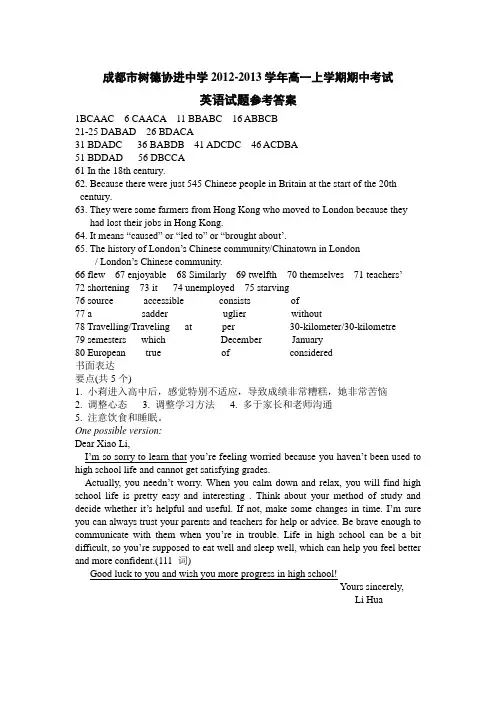
成都市树德协进中学2012-2013学年高一上学期期中考试英语试题参考答案1BCAAC 6 CAACA 11 BBABC 16 ABBCB21-25 DABAD 26 BDACA31 BDADC 36 BABDB 41 ADCDC 46 ACDBA51 BDDAD 56 DBCCA61 In the 18th century.62. Because there were just 545 Chinese people in Britain at the start of the 20th century.63. They were some farmers from Hong Kong who moved to London because theyhad lost their jobs in Hong Kong.64. It means “caused” or “led to” or “brought about’.65. The history of London’s Chinese community/Chinatown in London/ London’s Chinese community.66 flew 67 enjoyable 68 Similarly 69 twelfth 70 themselves 71 teachers’72 shortening 73 it 74 unemployed 75 starving76 source accessible consists of77 a sadder uglier without78 Travelling/Traveling at per 30-kilometer/30-kilometre79 semesters which December January80 European true of considered书面表达要点(共5个)1. 小莉进入高中后,感觉特别不适应,导致成绩非常糟糕,她非常苦恼2. 调整心态3. 调整学习方法4. 多于家长和老师沟通5. 注意饮食和睡眠。
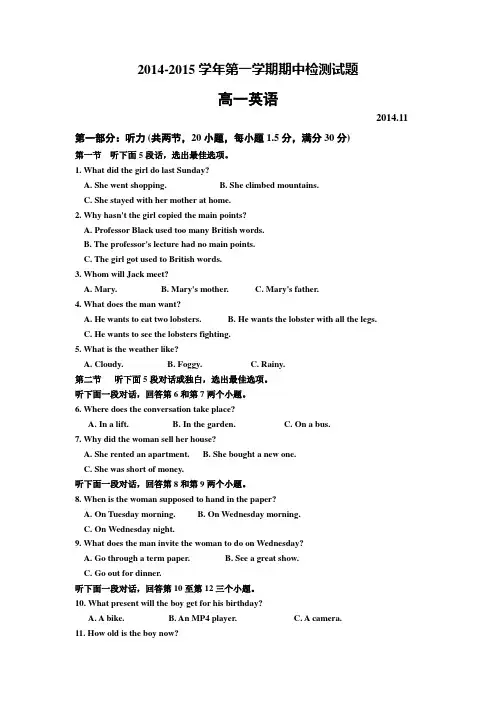
2014-2015学年第一学期期中检测试题高一英语2014.11 第一部分:听力 (共两节,20小题,每小题1.5分,满分30分)第一节听下面5段话,选出最佳选项。
1. What did the girl do last Sunday?A. She went shopping.B. She climbed mountains.C. She stayed with her mother at home.2. Why hasn't the girl copied the main points?A. Professor Black used too many British words.B. The professor's lecture had no main points.C. The girl got used to British words.3. Whom will Jack meet?A. Mary.B. Mary's mother.C. Mary's father.4. What does the man want?A. He wants to eat two lobsters.B. He wants the lobster with all the legs.C. He wants to see the lobsters fighting.5. What is the weather like?A. Cloudy.B. Foggy.C. Rainy.第二节听下面5段对话或独白,选出最佳选项。
听下面一段对话,回答第6和第7两个小题。
6. Where does the conversation take place?A. In a lift.B. In the garden.C. On a bus.7. Why did the woman sell her house?A. She rented an apartment.B. She bought a new one.C. She was short of money.听下面一段对话,回答第8和第9两个小题。
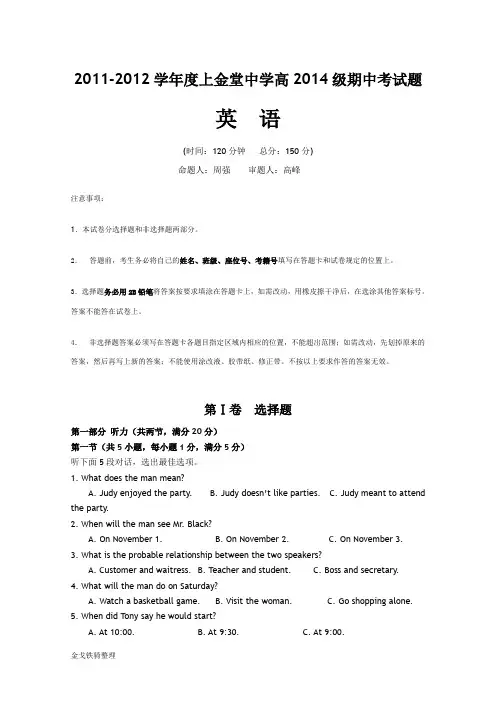
金戈铁骑整理 2011-2012学年度上金堂中学高2014级期中考试题 英 语 (时间:120分钟 总分:150分) 命题人:周强 审题人:高峰
注意事项: 1.本试卷分选择题和非选择题两部分。 2. 答题前,考生务必将自己的姓名、班级、座位号、考籍号填写在答题卡和试卷规定的位置上。 3.选择题务必用2B铅笔将答案按要求填涂在答题卡上,如需改动,用橡皮擦干净后,在选涂其他答案标号。答案不能答在试卷上。
4. 非选择题答案必须写在答题卡各题目指定区域内相应的位置,不能超出范围;如需改动,先划掉原来的答案,然后再写上新的答案;不能使用涂改液、胶带纸、修正带。不按以上要求作答的答案无效。
第Ⅰ卷 选择题 第一部分 听力(共两节,满分20分) 第一节(共5小题,每小题1分,满分5分) 听下面5段对话,选出最佳选项。 1. What does the man mean? A. Judy enjoyed the party. B. Judy doesn’t like parties. C. Judy meant to attend the party. 2. When will the man see Mr. Black? A. On November 1. B. On November 2. C. On November 3. 3. What is the probable relationship between the two speakers? A. Customer and waitress. B. Teacher and student. C. Boss and secretary. 4. What will the man do on Saturday? A. Watch a basketball game. B. Visit the woman. C. Go shopping alone. 5. When did Tony say he would start? A. At 10:00. B. At 9:30. C. At 9:00. 第二节(共15小题,每小题1分,满分15分) 金戈铁骑整理
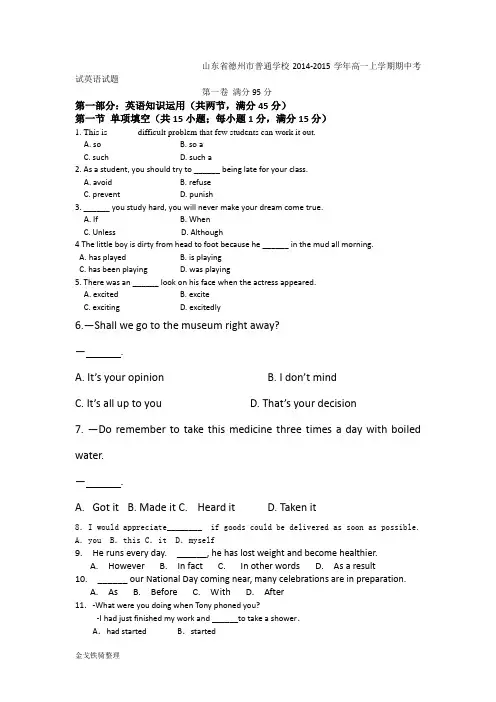
山东省德州市普通学校2014-2015学年高一上学期期中考试英语试题第一卷满分95分第一部分:英语知识运用(共两节,满分45分)第一节单项填空(共15小题;每小题1分,满分15分)1. This is ______ difficult problem that few students can work it out.A. soB. so aC. suchD. such a2. As a student, you should try to ______ being late for your class.A. avoidB. refuseC. preventD. punish3. ______ you study hard, you will never make your dream come true.A. IfB. WhenC. UnlessD. Although4 The little boy is dirty from head to foot because he ______ in the mud all morning.A. has playedB. is playingC. has been playingD. was playing5. There was an ______ look on his face when the actress appeared.A. excitedB. exciteC. excitingD. excitedly6.—Shall we go to the museum right away?—.A. It’s your opinionB. I don’t mindC. It’s all up to youD. That’s your decision7. —Do remember to take this medicine three times a day with boiled water.—.A. Got itB. Made itC. Heard itD. Taken it8.I would appreciate________ if goods could be delivered as soon as possible. A.you B.this C.it D.myself9. He runs every day. ______, he has lost weight and become healthier.A. HoweverB. In factC. In other wordsD. As a result10. ______ our National Day coming near, many celebrations are in preparation.A. AsB. BeforeC. WithD. After11.-What were you doing when Tony phoned you?-I had just finished my work and ______to take a shower.A.had started B.startedC.have started D.was starting12.The man we followed suddenly stopped ______whether he was going in the right direction.A.to see B.having seenC. seeing D.to have seen13.Most of the artists _____ to the party were from South Africa.A. invitedB. to inviteC. being invitedD. had been invited14.When I got on the bus,I ________ I had left my wallet at home.A.was realizing B.realizedC.have realized D.would realize15.The students, ____ at the way the question was put, didn’t know how to answerit.A being surprised B. surprising C. surprised D. having surprised第二节完形填空(共20小题;每小题1.5分,满分30分)阅读下面短文,从短文后所给各题的四个选项(A、B、C、D)中,选出可以填入空白处的最佳选项。
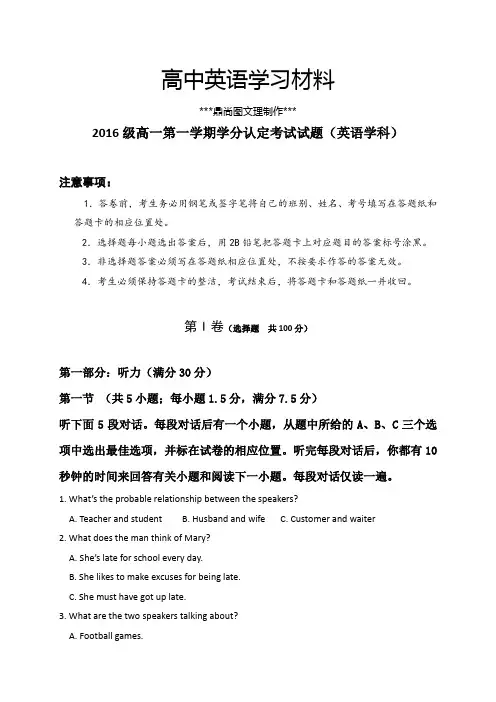
高中英语学习材料***鼎尚图文理制作***2016级高一第一学期学分认定考试试题(英语学科)注意事项:1.答卷前,考生务必用钢笔或签字笔将自己的班别、姓名、考号填写在答题纸和答题卡的相应位置处。
2.选择题每小题选出答案后,用2B铅笔把答题卡上对应题目的答案标号涂黑。
3.非选择题答案必须写在答题纸相应位置处,不按要求作答的答案无效。
4.考生必须保持答题卡的整洁,考试结束后,将答题卡和答题纸一并收回。
第I卷(选择题共100分)第一部分:听力(满分30分)第一节(共5小题;每小题1.5分,满分7.5分)听下面5段对话。
每段对话后有一个小题,从题中所给的A、B、C三个选项中选出最佳选项,并标在试卷的相应位置。
听完每段对话后,你都有10秒钟的时间来回答有关小题和阅读下一小题。
每段对话仅读一遍。
1. What’s the probable relationship between the speakers?A. Teacher and studentB. Husband and wifeC. Customer and waiter2. What does the man think of Mary?A. She’s late for school every day.B. She likes to make excuses for being late.C. She must have got up late.3. What are the two speakers talking about?A. Football games.B. The position of Iranian womenC. The interest of some Iranian women.4. What time will the woman arrive?A. At 8:30B. At 9:00C. At 9:305. Who wants to borrow a camera?A. AliceB. JaneC. Mary第二节(共15小题;每题1.5分,满分22.5分)听下面5段对话或独白。
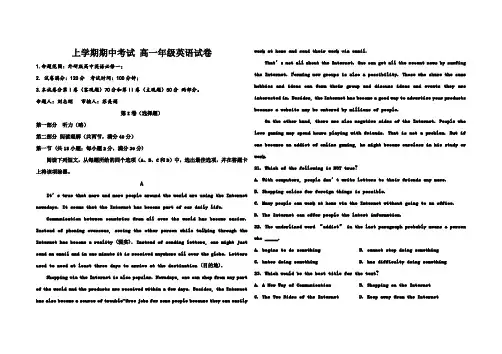
上学期期中考试高一年级英语试卷1.命题范围:外研版高中英语必修一;2. 试卷满分:120分考试时间:100分钟;3.本试卷分第I卷(客观题)70分和第II卷(主观题)50分两部分。
命题人:刘志刚审核人:苏美娟第I卷(选择题)第一部分听力(略)第二部分阅读理解(共两节,满分40分)第一节 (共15小题;每小题2分,满分30分)阅读下列短文,从每题所给的四个选项(A、B、C和D)中,选出最佳选项,并在答题卡上将该项涂黑。
AIt’s true that more and more people around the world are using the Internet nowadays. It seems that the Internet has become part of our daily life.Communication between countries from all over the world has become easier. Instead of phoning overseas, seeing the other person while talking through the Internet has become a reality (现实). Instead of sending letters, one might just send an email and in one minute it is received anywhere all over the globe. Letters used to need at least three days to arrive at the destination (目的地).Shopping via the Internet is also popular. Nowadays, one can shop from any part of the world and the products are received within a few days. Besides, the Internet has also become a source of trouble-free jobs for some people because they can easily work at home and send their work via email.That’s not all about the Internet. One can get all the recent news by surfing the Internet. Forming new groups is also a possibility. Those who share the same hobbies and ideas can form their group and discuss ideas and events they are interested in. Besides, the Internet has become a good way to advertise your products because a website may be entered by millions of people.On the other hand, there are also negative sides of the Internet. People who love gaming may spend hours playing with friends. That is not a problem. But if one becomes an addict of online gaming, he might become careless in his study or work.21. Which of the following is NOT true?A. With computers, people don’t write letters to their friends any more.B. Shopping online for foreign things is possible.C. Many people can work at home via the Internet without going to an office.D. The Internet can offer people the latest information.22. The underlined word “addict” in the last paragraph probably means a person who _____.A. begins to do somethingB. cannot stop doing somethingC. hates doing somethingD. has difficulty doing something23. Which would be the best title for the text?A. A New Way of CommunicationB. Shopping on the InternetC. The Two Sides of the InternetD. Keep away from the InternetBAs the father of a student, I have experienced first hand what a great teacher is. My son was in the 4th grade last year, and he had a teacher called Miss Green.I believe that when he is an adult he will surely look back on her as the best teacher he has ever had.My son has attention deficit disorder (注意力缺损症) that makes it a little more difficult for him to learn. She was able to change her teaching methods for him so that he could keep up with the rest of the class. As a result, he got straight As on many subjects. She regarded her class as a family and they even had their own class song. She would often have them sing it to encourage them and develop a team spirit for them. When she saw that they were no longer listening carefully to what she was teaching, she would have them close their textbooks, stand up all around the room and throw around a small foot ball. This helped them clear their minds and then focus on the lesson again. Besides, she was quick to reply to any phone calls or emails from us and got rid of our worries about children quickly.When my son went to the 5th grade this year, we happened to pass her classroom. When she saw my son, her face lit up (露出喜色) and she came out and hugged him. She generally loves all of the children in her classroom and that love really shows.I can only pray (祈祷) that my son will continue to get teachers just like her for the rest of his school years.24. With the teacher’s help, the writer’s son _____.A. became the best student in his classB. was interested in singing songsC. quickly finished his 4th grade lessonsD. improved his grades greatly25. Which of the following is NOT true about Miss Green?A. She regarded the students as members of a family.B. She had special ways to help students study.C. She was good at teaching football and music.D. She usually made a quick reply to parents’ emails.26. We can learn from the text that _____.A. Miss Green was the best teacher at the schoolB. all the students in the school liked Miss GreenC. Miss Green didn’t teach the writer’s son in the 5th gradeD. the writer’s son had many teachers like Miss Green27. In the text, the writer mainly tells us _____.A. what his son studied at schoolB. his son once had a good teacherC. how to be a good and popular teacherD. a teacher who liked playing with studentsCWe’re surrounded by chemistry in everyday life. Sometimes it is easy to see, like when your science teacher does a big experiment in class. At other times, it can be pretty hard to see everyday chemistry at work, but nearly everything youtouch or use has some element of chemistry in it.Something as simple as toothpaste contains at least three chemicals, if not more. It is the mixture of them and its chemical reaction that keeps your teeth clean. Other things you use every day are created by chemistry, such as hair products, shampoo and soap. Adding detergent (洗涤剂) to water involves chemistry. Without chemistry, we would never have known that we need soap to get the oil out of clothes or skin.Chemistry not only helps us make products for use, but it also helps us understand the world around us. Chemistry helps us understand what the ozone layer (臭氧层) is and how it protects us. Chemistry also gives us sunscreen to protect us from the sun. Thanks to chemistry, we know bleach (漂白剂) can’t be mixed with vinegar, because it can produce poisonous gas. Without chemistry, we wouldn’t have fireworks displays on important days.Chemistry plays a big role in food preparation. Cooking food causes it to go through a chemical change. That is why cooked food often tastes different from raw food. Baking is a great example of chemistry. Too much or too little of any ingredient makes a difference to the result of baking, for example, the dough (面团) won’t rise or the cake will be flat.Chemistry isn’t something that just lives in a lab; it’s something that you meet hundreds of times every day. Knowing how chemistry works will give you a greater understanding of the science behind some of the simplest-looking things.28. What’s the main idea of Paragraph 1?A. Chemistry is easy to see around us.B. Sometimes chemistry is hard to see around us.C. How a science teacher does a big experiment.D. Few things in everyday life contain chemistry.29. The following actions are about chemistry EXCEPT _____.A. cleaning teeth with toothpasteB. washing hair with hair productsC. using soap to get the oil out of clothesD. washing your face with water30. Which one is TRUE according to Paragraph 4?A. One can’t find chemistry when cooking food.B. Chemistry plays an important part in food making.C. That dough rises is nothing to do with chemistry.D. A flat cake is the result of too many ingredients.31. Which of the following would be the best title for the text?A. Chemistry Around the HouseB. Chemistry in ScienceC. Chemistry for DinnerD. Chemistry in everyday lifeDNo matter where you travel in Asia, you’ll find yourself faced with a new culture. You can start your Asian exploration by visiting some of these attractive cities first.Beijing, ChinaBeijing is the second largest city in China and serves as the capital. The cityis so old, in fact, that almost every building has some sort of cultural or historic features — no matter how small. Getting around the city you’ll find yourself faced with amazing temples (寺庙), the largest palaces in the world, and many works of art that leave you breathless.Siem Reap, Cambodia (柬埔寨)Siem Reap is the capital city of Siem Reap Province in northwestern Cambodia. Siem Reap has a lot of French and Chinese-style architecture. In the city, there are traditional dance performances, silk farms, fishing villages and a bird sanctuary (保护区) near the Tonle Sap Lake. Siem Reap today, being a popular tourist attraction, has a large number of hotels and restaurants.Kathmandu, Nepal (尼泊尔)Situated in the heart of the Himalayans, Kathmandu, the largest city and capital of Nepal, is considered to be one of the most outstanding cities in the world today. The shopping districts are world famous and the hotels in Kathmandu are among the most comfortable in the world.Kyoto, JapanThe city of Kyoto served as the capital of Japan from 794 to 1868. No longer the capital, it is known for being the seventh largest city in Japan. Kyoto was destroyed throughout history by fires and war. But now the city is home to more than 1.4 million people, and it presents a modern face to the rest of the world.Every city throughout Asia has a story of its own. It’s up to you to explore them all and find out exactly what each one has to offer. Enjoy! 32. If you want to visit the biggest place where ancient emperors lived in the world, you can go to _____.A. BeijingB. Siem ReapC. KathmanduD. Kyoto33. In Siem Reap you can see the following EXCEPT _____.A. Chinese-style buildingsB. excellent art worksC. traditional dancesD. a protected bird area34. We can learn from the passage that _____.A. the cities are all capital cities nowB. Beijing is the largest city in ChinaC. all the cities have their own storiesD. one can’t find a good hotel in Kathmandu35. The writer’s purpose in writing the passage is _____.A. to introduce several attractive cities in AsiaB. to compare some tourist cities in AsiaC. to tell readers not to visit European citiesD. to write an advertisement about a travel company第二节(共5小题;每小题2分,满分10分)根据短文内容,从短文后的选项中选出能填入空白处的最佳选项。
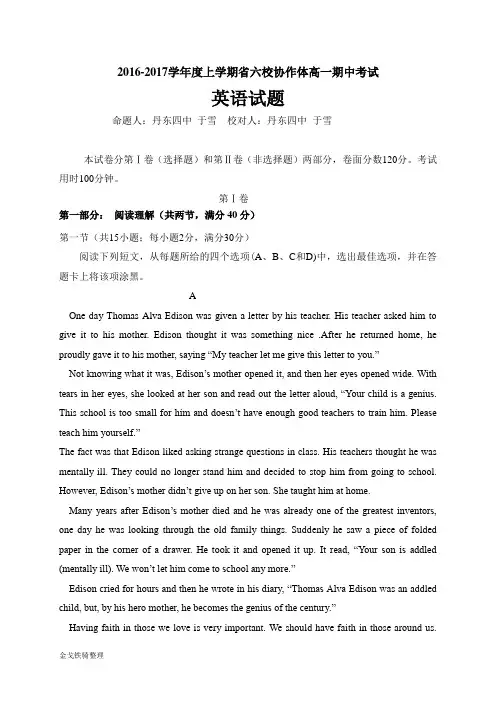
矿产资源开发利用方案编写内容要求及审查大纲
矿产资源开发利用方案编写内容要求及《矿产资源开发利用方案》审查大纲一、概述
㈠矿区位置、隶属关系和企业性质。
如为改扩建矿山, 应说明矿山现状、
特点及存在的主要问题。
㈡编制依据
(1简述项目前期工作进展情况及与有关方面对项目的意向性协议情况。
(2 列出开发利用方案编制所依据的主要基础性资料的名称。
如经储量管理部门认定的矿区地质勘探报告、选矿试验报告、加工利用试验报告、工程地质初评资料、矿区水文资料和供水资料等。
对改、扩建矿山应有生产实际资料, 如矿山总平面现状图、矿床开拓系统图、采场现状图和主要采选设备清单等。
二、矿产品需求现状和预测
㈠该矿产在国内需求情况和市场供应情况
1、矿产品现状及加工利用趋向。
2、国内近、远期的需求量及主要销向预测。
㈡产品价格分析
1、国内矿产品价格现状。
2、矿产品价格稳定性及变化趋势。
三、矿产资源概况
㈠矿区总体概况
1、矿区总体规划情况。
2、矿区矿产资源概况。
3、该设计与矿区总体开发的关系。
㈡该设计项目的资源概况
1、矿床地质及构造特征。
2、矿床开采技术条件及水文地质条件。
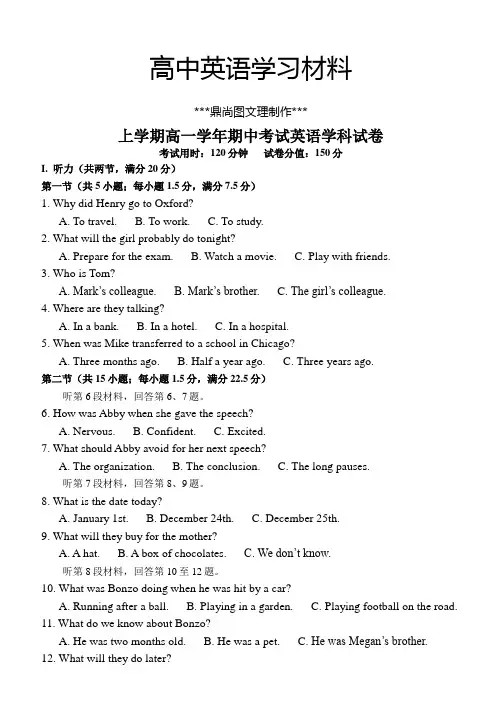
高中英语学习材料***鼎尚图文理制作***上学期高一学年期中考试英语学科试卷考试用时:120分钟试卷分值:150分I. 听力(共两节,满分20分)第一节(共5小题;每小题1.5分,满分7.5分)1. Why did Henry go to Oxford?A. To travel.B. To work.C. To study.2. What will the girl probably do tonight?A. Prepare for the exam.B. Watch a movie.C. Play with friends.3. Who is Tom?A. Mark’s colleague.B. Mark’s brother.C. The girl’s colleague.4. Where are they talking?A. In a bank.B. In a hotel.C. In a hospital.5. When was Mike transferred to a school in Chicago?A. Three months ago.B. Half a year ago.C. Three years ago.第二节(共15小题;每小题1.5分,满分22.5分)听第6段材料,回答第6、7题。
6. How was Abby when she gave the speech?A. Nervous.B. Confident.C. Excited.7. What should Abby avoid for her next speech?A. The organization.B. The conclusion.C. The long pauses.听第7段材料,回答第8、9题。
8. What is the date today?A. January 1st.B. December 24th.C. December 25th.9. What will they buy for the mother?A. A hat.B. A box of chocolates.C. We don’t know.听第8段材料,回答第10至12题。
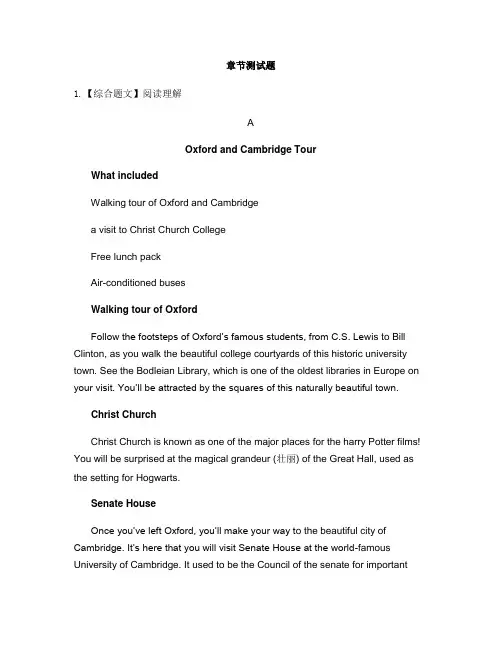
章节测试题1.【综合题文】阅读理解AOxford and Cambridge TourWhat includedWalking tour of Oxford and Cambridgea visit to Christ Church CollegeFree lunch packAir-conditioned busesWalking tour of OxfordFollow the footsteps of Oxford’s famous students, from C.S. Lew is to Bill Clinton, as you walk the beautiful college courtyards of this historic university town. See the Bodleian Library, which is one of the oldest libraries in Europe on your visit. You’ll be attracted by the squares of this naturally beautiful town.Christ ChurchChrist Church is known as one of the major places for the harry Potter films! You will be surprised at the magical grandeur (壮丽) of the Great Hall, used as the setting for Hogwarts.Senate HouseOnce you’ve left Oxford, you’ll make your way t o the beautiful city of Cambridge. It’s here that you will visit Senate House at the world-famous University of Cambridge. It used to be the Council of the senate for importantmeetings, but it is now the chosen place for students’ degree celebration. You’ll get to travel this special place and discover its important history.Please Note:You must bring the e-ticket to enter this tour.Bookings which are made after midnight for the same day will not include a free lunch pack.During busy periods, buses without Wi-Fi may be used.TimeApril 1 to October 31Days of departure Tuesday, Thursday and SaturdayCheck-in: 8:00 amDeparture: 8:30 amReturn: 7:00 pm【答题】( ) Which of the following is included in the tour?A. Free breakfast pack.B. Free buses travelling in Oxford.C. Professors introduction.D. Air-conditioned buses.【答案】D【分析】本题考查细节理解。
高一英语期中考试题 2014.11 注意事项:1.本试题分第Ⅰ卷和第Ⅱ卷两部分。第Ⅰ卷为选择题,共115分;第Ⅱ卷为非选择题,共35分;满分150分。考试时间为120分钟。 2.考生务必把第一卷的选择题涂在答题卡上,第二卷的非选择题答在答题卷上。 第Ⅰ卷 选择题 (共115分) 第一部分:听力(共20小题;每小题1.5分,满分30分) 第一节(共5小题,每小题1.5分,满分7.5分) 听下面5段对话。每段对话后有一个小题,从题中所给的A、B、C三个选项中选出最佳选项。听完每段对话后,你都有10秒钟的时间来回答有关小题和阅读下一小题。每段对话仅读一遍。 1. What leads to(导致) the woman’s high score(高分)? A.Doing a lot of homework. B.Reading a lot. C.Attending every lecture(上每节课). 2. What does the man mean? A.They are not likely(可能的) to get help from Debbie. B.They should help Debbie. C.Debbie is ready to help. 3. When did the man tell the girl to come to his office? A.In the morning. B.In the afternoon. C.In the evening. 4. Which is Steven’s favorite? A.His wife. B.His money. C.His job. 5. What will be totally forbidden(禁止) in the class? A.Using mobile phones. B.Eating snacks(点心) C.Chatting. 第二节(共15小题,每小题1.5分,满分22.5分) 听下面五段对话或独白。每段对话或独白后有几个小题,从题中所给的A B C三个选项中选出最佳选项,并标在试卷的相应位置。听每段对话或独白前,你将有时间阅读各个小题,每小题5秒钟;听完后各小题将给出5秒钟的作答时间。每段对话或独白读两遍。 听第6段材料,回答第6-7题。 6. When will the woman leave the company? A.At the end of this month. B.At the end of next month. C.At the end of this week. 7. Why does the woman want to leave the company? A.The pay is too low here. B.She wants to be a doctor. C.She wants to study for a doctor’s degree. 听第7段材料,回答第8-9题。 8. What would the woman like for breakfast? A.Eggs and bread. B.Sausages (香肠)and bacon(培根). C.Just coffee. 9. What do we know about the woman? A.She doesn’t like to eat breakfast. B.She has a lot of work to do today. C.She feels very hungry in the morning. 听第8段材料,回答第10-12题。 10.Which of the following subjects did the boy do most poorly? A. French. B.Maths. C.Biology. 11. What does the woman think of the exam results? A.So poor. B.Very good. C.Just so-so. 12. What does the woman ask the boy to do? A.Go over his lessons. B.Go to a training school. C.Make a travel plan. 听第9段材料,回答第13-16题。 13. What color is the dog? A.Black. B.White. C.Black and white. 14. Where does the conversation take place? A.In the mountain. B.By the lakeside(湖边). C.On the highway. 15. How is the woman feeling now? A.Ashamed(惭愧的). B.Worried. C.Disappointed. 16. What can we learn from the conversation? A.The dog doesn’t know the way. B.The dog is stolen(偷) by someone. C.The man is warm-hearted(热心的). 听第10段材料,回答第17-20题。 17. Why did the woman start swimming? A.Her husband persuaded (说服)her to do so. B.She wanted to get healthy. C.She had nothing to do. 18. When did the woman join the swimming club? A.About one year ago. B.About two years ago. C.About three years ago. 19. What does the woman have to do every day besides practising? A.Study at home. B.Take care of the children and house. C.Take part in some club activities. 20. How does the woman’s husband feel about her? A.He is proud of her. B.He would rather she did more housework. C.He hopes she can take something more interesting. 第二部分 英语知识运用(满分40分) 第一节:语法和词汇知识(共10小题;每小题1分,满分10分) 21. The expression on her face suggested she was when she heard the news. A. astonishing; astonished B. astonished; astonishing C. astonished; astonished D. astonishing; astonishing 22.It is the second time that I ___ Shanghai. What great changes! It’s ten years since I_ here last time. A. visited; have come B. had visited ; came C. visited ; had come D. have visited ; came 23. The song sung by Jay Chou is perfect; to tell you the truth, I have never heard before. A.the worst one B.the best one C.a better one D.a worse one 24. His entire education no more than one year. A. added to B. added up to C. was added to D. was added up to 25. The computer centre, last year, is very popular among the students in this school. A. open B. opening C. having opened D. opened 26. The Group of Eight (G8) the eight richest countries in the world. A. consists of B. is consisted of C. is made up D. consists in 27. It was dark. We decided to for the night at a farmhouse. A. put up B. put down C. put away D. put on 28. Father used to after dinner, but now he is used to tea after dinner. A. smoke; drink B. smoking; drinking C. smoking; drinking D. smoke; drinking 29. Our textbook six modules, each of which a cultural corner. A. contains; includes B. contains; contains